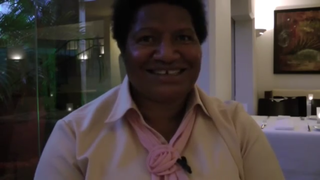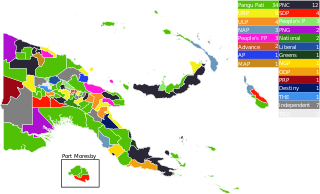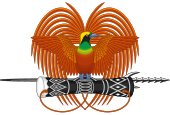
The politics of Papua New Guinea takes place in a framework of a parliamentary representative democratic multi-party system, whereby the prime minister is the head of government. Papua New Guinea is an independent Commonwealth realm, with the monarch serving as head of state and a governor-general, nominated by the National Parliament, serving as their representative. Executive power is exercised by the government. Legislative power is vested in both the government and parliament.

The National Parliament of Papua New Guinea is the unicameral national legislature in Papua New Guinea. It was created in 1964 as the House of Assembly of Papua and New Guinea but gained its current name after the nation was granted independence in 1975.
Instant-runoff voting (IRV) is a ranked voting method used in single-winner elections. IRV is also known outside the US as the alternative vote (AV). Today it is in use at a national level to elect the Australian House of Representatives, the National Parliament of Papua New Guinea, the President of Ireland and President of India. In Australia it is also used for elections to the legislative assemblies of all states and territories except Tasmania and the Australian Capital Territory, and for the Tasmanian Legislative Council.

In Australian politics, the two-party-preferred vote is the result of an election or opinion poll after preferences have been distributed to the highest two candidates, who in some cases can be independents. For the purposes of TPP, the Liberal/National Coalition is usually considered a single party, with Labor being the other major party. Typically the TPP is expressed as the percentages of votes attracted by each of the two major parties, e.g. "Coalition 50%, Labor 50%", where the values include both primary votes and preferences. The TPP is an indicator of how much swing has been attained/is required to change the result, taking into consideration preferences, which may have a significant effect on the result.

General elections were held in Papua New Guinea from 30 June 2007 to 14 July 2007.
James Yapa Lagea is a Papua New Guinea politician. He has been a member of the National Parliament of Papua New Guinea since July 2007, representing the electorate of Kagua-Erave Open. He has been Vice-Minister for Health and HIV/AIDS in the government of Peter O'Neill since August 2012. He has variously been a member of the PNG Conservative Party (2007), National Alliance (2007–2010), United Resources Party (2010–2012) and Papua New Guinea Party (2012); although formally sitting in parliament as an independent during his second term, he has been prominently aligned with the People's United Assembly (2012–2014) and the People's National Congress (2014–present).

Sir Puka Temu,, is a Papua New Guinean politician. He has been a member of the National Parliament of Papua New Guinea since 2002, representing the electorate of Abau Open. A former Deputy Prime Minister under Michael Somare, he is part of Prime Minister James Marape's government as a member of the Our Development Party.
Koni Iguan is a Papua New Guinea politician. He has been a Pangu Party member of the National Parliament of Papua New Guinea since 2017, representing the Markham Open electorate. He formerly held the same seat from 2007 to 2012.

An electoral or voting system is a set of rules used to determine the results of an election. Electoral systems are used in politics to elect governments, while non-political elections may take place in business, non-profit organisations and informal organisations. These rules govern all aspects of the voting process: when elections occur, who is allowed to vote, who can stand as a candidate, how ballots are marked and cast, how the ballots are counted, how votes translate into the election outcome, limits on campaign spending, and other factors that can affect the result. Political electoral systems are defined by constitutions and electoral laws, are typically conducted by election commissions, and can use multiple types of elections for different offices.

General elections were held in Papua New Guinea from 23 June until around 13 July 2012, after being postponed by a further week to allow for security personnel to crisscross the country, particularly the highland provinces. The elections followed controversy over incomplete electoral rolls and a constitutional crisis caused by a dispute over the office of prime minister between Michael Somare and Peter O'Neill.

Delilah Pueka Gore is a Papua New Guinean politician. She was a member of the National Parliament of Papua New Guinea from 2012 to 2017, representing the electorate of Sohe Open. She was Minister for Higher Education, Science, Research and Technology and later Minister for Religion, Youth & Community Development in the government of Peter O'Neill.

General elections were held in Papua New Guinea between 24 June and 8 July 2017. The writs for the election were issued on 20 April, and candidate nominations closed on 27 April.
Star Alliance Party is a political party in Papua New Guinea.
A presidential and parliamentary election was held in the Autonomous Region of Bougainville between 11 May and 25 May 2015. Incumbent President John Momis won re-election, the first President of the Autonomous Region of Bougainville to do so.

Julie Soso Akeke is a Papua New Guinean politician. She was the Governor of Eastern Highlands Province from 2012 to 2017.

General elections were held in the Territory of Papua and New Guinea between 19 February and 11 March 1972. They saw the election of the country's first female MP, Josephine Abaijah.

General elections were held in Papua New Guinea from 4 to 22 July 2022 to elect the members of the National Parliament for a new five-year term.
Job Pomat CMG is a Papua New Guinean politician. He has represented the electorate of Manus Open in the National Parliament of Papua New Guinea on two separate occasions since 2007 and has been Speaker of the National Parliament since 2017.
Rufina Peter is a Papua New Guinean agricultural economist and politician. Until her election to the National Parliament on 5 August 2022, Papua New Guinea (PNG) was one of only three countries without a woman in parliament. She was also elected as Governor of Central Province in the 2022 general election, becoming the province's first female governor.

General elections will be held in Papua New Guinea at some point in or before 2027 to elect members of the National Parliament.











